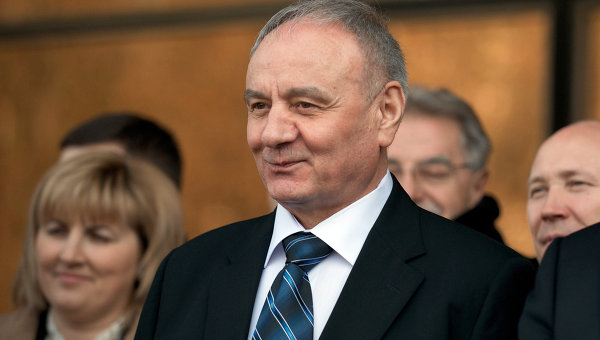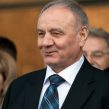
Moldova Finally Elects a Head of State
Publication: Eurasia Daily Monitor Volume: 9 Issue: 55
By:

On March 16, 2012, the Moldovan parliament elected Nicolae Timofti as state president, a post technically vacant since April 2009. Proposed by the governing Alliance for European Integration (AEI, comprised of three parties), Timofti garnered 62 votes, one more than minimally necessary in the 101-seat parliament. Timofti was the single candidate in this eighth attempt to elect a Moldovan head of state in almost three years. Most of the previous attempts had also involved single candidacies.
The AEI’s total of 58 votes in parliament would not have sufficed to elect the head of state. The election became successful thanks to three votes from the Party of Socialists, a Russia-oriented group of defectors from the Communist Party. The Communists (with 39 parliamentary seats) boycotted the election and instigated mass protests in Chisinau to overshadow the vote in parliament (Moldpres, March 16, 17, 19; see EDM, March 15, 16).
The AEI’s choice of Timofti will remind historians of the selection of a weak king by agreement among the barons – in this case, the AEI’s political leaders. Timofti is a senior judge with no political affiliation or ambitions, no team of his own, no experience with foreign policy, economics, or internal politics, and no exposure to or contacts in the West. Born to a peasant family in 1948, Timofti graduated from the Moldovan SSR State University’s law department in 1972, rose through the ranks of the late Soviet-era judiciary to become a Moldovan Supreme Court justice (1980), Supreme Court vice-president (1990), president of the Court of Appeals (1996-2001), head of the Moldovan Judges’ Association (since 1996), and head of the Higher Magistrate Council (self-regulatory body of the judicial branch) since 2011 (Moldpres, March 14, 15). Timofti is untainted by political intrigues or corruption.
Timofti cannot be more different from Moldova’s previous state presidents – Mircea Snegur (1991-1996), Petru Lucinschi (1997-2001), and Vladimir Voronin (2001-2009). Those presidents were affiliated with influential political parties (pre-existing ones, or created by them), had political networks and advisory teams built around their persons, commanded loyalties among government ministers, and pursued ambitions to increase the powers of the presidential office by re-interpreting the constitution. Timofti, however, will not be a political player or a decision-maker of any significance. The AEI parties’ leaders have reserved such roles to themselves by selecting Timofti as head of state. He will be a presidential figurehead, and possibly also a transitional figure until the next parliamentary elections due in 2014.
In a televised address on the eve of the parliamentary vote, and a half-hour speech to the parliament on the morning of the vote, Timofti sketched out his views of Moldova’s priorities. European integration tops the list (and he will pay his first visit as president-elect to Brussels). Judicial reform (which the AEI has failed to deliver from 2009 to date) and friendly relations with the neighboring countries (Romania and Ukraine) are among his other generalities. He barely mentioned Russia in a passing remark. Timofti’s inexperience showed when referring to Moldova as a “bridge between east and west” (incompatible with his own top priority, European integration); as did his indecision when replying, “now is not the time for unification with Romania” (instead of referencing the existing constitution, which he will be obligated to uphold as president).
Moscow and the Socialists tend to interpret Moldovan politics as involving in significant measure a contest between Russia and Romania. In this spirit, Socialist leader Dodon set conditions for supporting the AEI’s presidential candidate: he should be politically unaffiliated (i.e., not beholden to the AEI), not hold dual Moldovan-Romanian citizenship, and uphold the constitutional name of the state language as “Moldovan” (rather than Romanian) (RFE/RL, March 9). The AEI had to take the Socialists’ conditions into account when selecting Timofti. Given the AEI’s internal rivalries and the Communists’ residual strength, the small Socialist group can exert disproportionate leverage in Moldova’s parliament.
This election has cast the Party of Socialists as holder of the balance of power in parliament. The Socialists have only three parliamentary deputies, including former deputy prime minister Igor Dodon and former prime minister Zenaida Greceanai (defectors from Communist ex-president Vladimir Voronin’s team). This group has potential to grow with Russian support. Unlike the Communist Party, the Socialists are profiling themselves as a “constructive opposition,” with a view to entering or influencing the government in a follow-up stage. The Socialists split off from the Communist Party in 2011. They expect to increase their electorate and parliamentary representation at the Communists’ expense. Moscow supports this project primarily because it needs a Russia-oriented party in Moldova, untainted by Communism.
The Communist Party mobilized tens of thousands of supporters for protest rallies and marches in Chisinau on the day of the presidential election. The Communists deem the parliament to be illegitimate (elected in November 2010, it prolonged its life beyond the one-year term allowed for electing a head of state). On this basis, the Communist Party refuses to recognize Timofti’s election as president. The Communists further complain that the balloting for Timofti in parliament was open, not secret. Nevertheless, the party has suspended street protests until May 1 (Infotag, March 16, 17).
Presidents Traian Basescu of Romania and Viktor Yanukovych of Ukraine, as well as Hungarian Prime Minister Viktor Orban and the European Commission, have congratulated Timofti within hours of the election, inviting him on official visits to their respective countries and Brussels.




